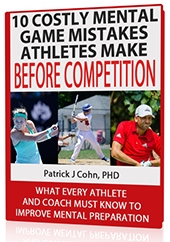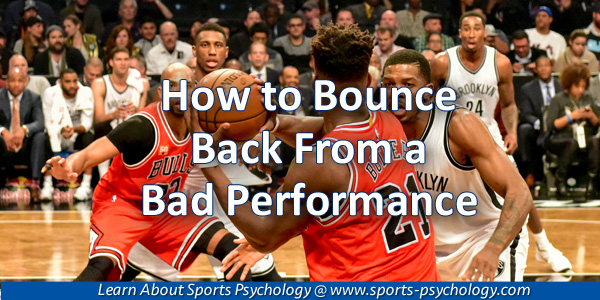How This Pro Bounces Back From a Bad Game
Summary: Every athlete experiences bad performances, regardless of talent or experience. While you cannot change the past, you can control how you respond. By focusing on controllable factors, learning from mistakes, maintaining confidence in your strengths, and preparing for the next competition, athletes can bounce back quickly and improve future performances.
Every athlete in every sport will have a bad performance. There are no exemptions from this rule… It is true for all athletes.
Yes, it stinks… Yes, it is hard to take… And, yes, sometimes it happens at the most inopportune times…
You can’t change that bad game, poor play, or shaky performance. That competition is in the past.
What you can control is how you respond and how you improve for the next competition.
With the right mindset, you can maintain a high level of confidence and quickly bounce back from a bad performance.
Lauri Markkanen is a rookie power forward with the Chicago Bulls and has no shortage of confidence.
After one college basketball season with the University of Arizona, Markkanen entered the 2017 NBA draft and was the 7th overall pick.
Confidence is often a struggle for such young players and, with being selected high in the draft, expectations can feel overwhelming which weighs heavy on a player’s confidence.
Despite all this, Markkanen has maintained a level of confidence even after having a bad game.
In one of the Bulls’ last preseason games, Markkanen had a dreadful game shooting 1-for-9, including 0-for-6 from three-point range.
MARKKANEN: “I just try to get back to the gym as quickly as possible and work on things. Watch film, what did I do wrong, missed shots and stuff like that. I’m ready to move on and play the next game. That’s what I love about this challenge. There’s a next one coming up quick.”
Two nights later, Markkanen bounced back from his previous poor performance and shot 7-for-12 overall and 4-for-7 from three-point range against one of the league’s best teams, the Cleveland Cavaliers.
How is Markkanen able to maintain his confidence and bounce back after a bad performance, even while facing great pressure?
There are a few mindsets at play that can help you bounce back after a bad performance.
You can Maintain your Confidence by Controlling What you Can Control:
- You can control your effort.
- You can learn from your past.
- You can look to improve your technique.
- You can let go of the past.
- You can focus on what is in front of you.
- You can focus on your strengths, talents and successes.
- You can choose a positive attitude.
If you want to maintain a high degree of confidence and quickly bounce back after a bad performance, have a mindset similar to Markkanen and tell yourself, “There’s another competition coming up,” to prepare for.
A Tip for Bouncing Back from a Bad Performance:
Control the Controllables – First, you need to identify what is under your control and those things which you cannot control.
Learn and Grow – Since you have no control over what has already happened, you need learn from the past and grow for the future.
Remember always, it’s not what happened that matters most; it is how you respond to what has happened that will make the biggest impact on future performances.
5 Tips for Bouncing Back from a Bad Performance
1. Control What You Can
Focus on factors within your control, such as your effort, preparation, attitude, and technique. Let go of what you cannot change, like referees’ calls, teammates’ mistakes, or past results.
2. Learn from Mistakes
Analyze your performance objectively. Watch film, review what went wrong, and identify areas for improvement. Turn mistakes into actionable lessons for the next game.
3. Focus on the Next Competition
Shift your mindset from the past to the future. Remind yourself, “There’s another competition coming up,” and concentrate on what you can achieve in the next performance.
4. Highlight Your Strengths
Maintain confidence by focusing on your talents, skills, and previous successes. Recognizing what you do well keeps your mindset positive and resilient.
5. Adopt a Positive Attitude
Your response to a poor performance is more important than the performance itself. Choose optimism, persistence, and determination to bounce back stronger.
Start today, by learning how to improve your focus with “The Focused Athlete.”
Related Sports Psychology Articles:
- Boosting Confidence in Young Athletes
- Improving Your Confidence to Play at Your Peak
- Confidence For Preforming New Skills in Competition
Free Mental Toughness Reports

Get instant access to a mental game report to improve your mental toughness. Are you making one or more of these “deadly” mental game mistakes prior to competition? You can improve your mental game with one of our free sports-specific reports below.
with our free mental toughness reports, you’ll:
- Discover if you have positive or negative pregame jitters.
- Identify your pre-competition mental game mistakes.
- Learn the important pregame mental skills to boost your performance and success!
Learn how mental game strategies can boost your mental toughness in sports with Dr. Cohn’s free mental game reports!
FAQ: Maintaining Confidence After a Bad Performance
Q: Why do athletes have bad performances?
A: Bad performances are inevitable and happen to every athlete. Factors can include nerves, poor execution, mistakes, or challenging competition.
Q: How can I maintain confidence after a bad game?
A: Focus on controllable factors, review mistakes constructively, rely on your strengths, and maintain a positive attitude.
Q: Should I dwell on mistakes?
A: No. Dwelling on mistakes wastes energy and reduces performance. Learn from them, then focus on the next opportunity.
Q: How quickly can I bounce back from a bad performance?
A: Quickly, if you shift your mindset, control your effort, and concentrate on improvement rather than past errors.
Q: What mindset helps athletes recover from poor performances?
A: A mindset that emphasizes resilience, learning, focus on the present, and optimism allows athletes to recover and perform better in future competitions.
Dr. Patrick Cohn is an expert mental performance coach who has helped athletes for over 30 years enhance their performance. Dr. Cohn earned a master’s degree in sports psychology from CSUF and a Ph.D. from the University of Virginia, specializing in Applied Sports Psychology.

